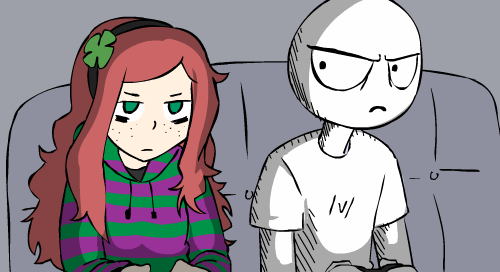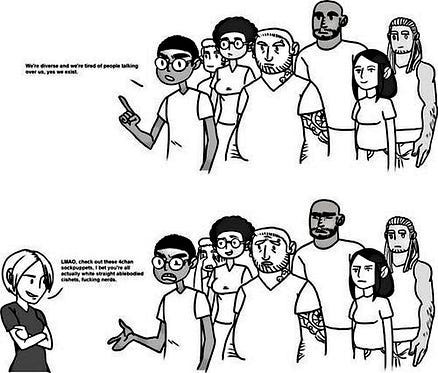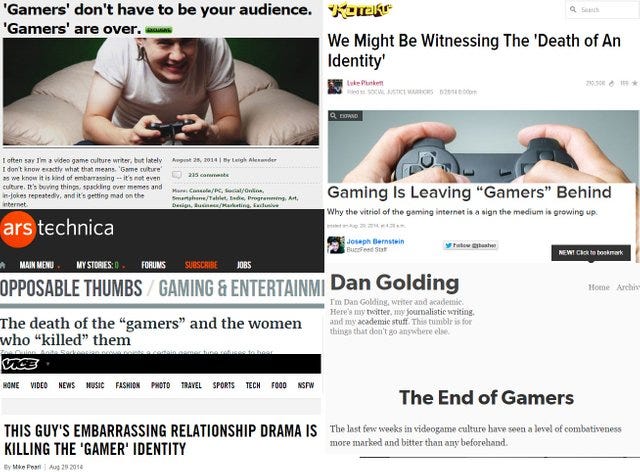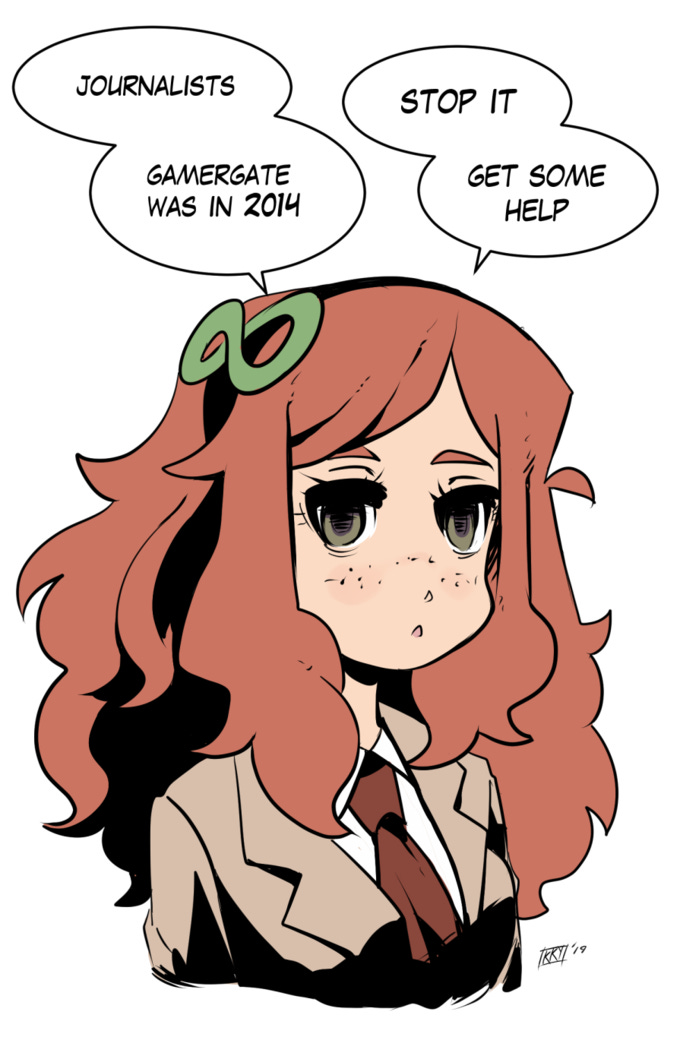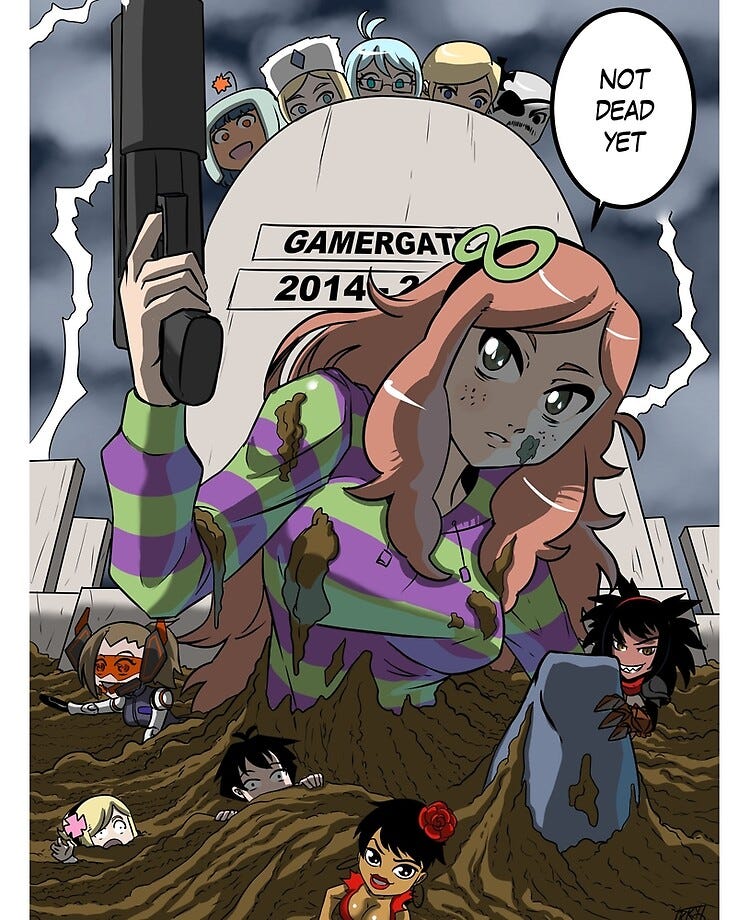The Culture Wars in Fandom through the lens of GamerGate
What better place to see the impact of gaming's culture wars, than one of its epicenters?
A cursory glance at social media on the contemporary discourse around video games is often enough to see the culture wars simmering within them. Within this sphere, among the most infamous manifestations is the GamerGate controversy.
Emerging on August 2014, what began as claims of unethical collusion involving games journalists and independent game developer Zoe Quinn turned into a vitriolic consumer revolt against dishonest reporting. For some like New Discourses contributor Damien Carlisle on September 19, 2020, it marked the first time gamers stood up against what’s called “Grievance Social Justice” and those trying to co-opt their hobbies for political ends, particularly the “woke.” For others, as many mainstream outlets like Vox and Buzzfeed have insisted over the years, it’s both a platform for harassment against women, and a reactionary movement holding back long-needed change in the industry. To this day, however, shades of this have continued to reverberate within the wider gaming sphere, with repercussions for fandom at large.
One place where further insight could be gleaned is the KotakuInAction (KiA) subreddit. First established on August 24, 2014 as an offshoot of the long-banned TumblrinAction, it remains a major hub for Gamergate supporters not only on Reddit, but across social media.
At its peak, it was one of the most active subreddits on the website. While statistics suggest that its heyday is far behind – with comments per day averaging a peak of almost 1,000 in 2023 compared to over 3,000 in 2019 – this community nonetheless continues to remain active. It continues to see growth, with over 146,000 members and multiple threads posted at any given time.
Being a former participant in that community, and having approached many of those still active over the course of May and June 2023, what better place to see the impact of gaming’s culture wars, than one of its epicenters?
Origins
Though many members have come and gone, one recurring constant is how they have different stories about how they got involved with KiA or Gamergate in general. Some claimed to have been gamers for decades and witnessed not only the panic against video games in the 2000s, spurred by moral guardians such as disbarred attorney Jack Thompson, but also the emergence of progressive activists like Anita Sarkeesian and other “social justice warriors” by the early 2010s. Others, myself included, either joined in the wake of the slanderous “Gamers are Dead” hitpieces around August-September 2014 – ostensibly in response to harassment against women and minorities – or later found themselves aboard after being censored over discussing them.
In contrast to the stereotype of “Alt-Right” Nazis and misogynistic white people, this resulted in early KiA being a rather mixed, if vaguely libertarian, collective. This diversity of views and social backgrounds manifested in the emergence of social media campaigns such as #NotYourShield in 2015, highlighting the experiences of female and minority gamers sidelined by those claiming to speak for them.
Not that it stopped some from throwing demeaning labels that people from across the globe and political spectrum, even a Filipino like myself, were white American bigots or part of some good old boys ‘ club. Still, bouts of infighting aside, the subreddit’s pretensions to being “politically neutral ground” had a foundation, albeit one that seems to have eroded with time.
“Reddit's administrative policies have [continually] tightened, and continues to strangle free and open debate,” long-time member webkilla opined. Blame has been placed on the platform’s unclear, if not arbitrary, penchant of banning certain conservative and American right communities over “hate speech.” As put by nullv, another old-timer, this led to right-wingers of such stripes increasingly dominating the conversation, in which “anything leaning to the left will be at the bottom in the negatives” while posts bashing or complaining against “wokeness” – even if it’s barely fandom-related – are more likely to be promoted.
This isn’t to say that it has fully devolved into an echo chamber like other online communities. Aside from a handful of left-leaning holdouts, there remained some arguments among members over varying topics, including gaming culture in Japan and Eastern Europe. That said, whatever factionalism’s still present had grown overshadowed by overlapping interests in fighting the culture war through an increasingly Americentric lens, to the point that some don’t even appear to notice any divergent views at all.
Glimpsing the Trenches
Another constant has been a focus on gaming and nerd culture. Some of the comments and posts would ring familiar to gamers in general, be it concerns over the abuse of microtransactions within the games industry, preferring independent developers over established corporations, or debating on how fandoms should approach gatekeeping.
There are some, however, who lament the infiltration of their hobbies by what Toshiba9152 called “blind normies,” who buy “SJW-plagued games which ensures survival of SJW game companies and developers.” Such sentiment seems to have grown more vocal over time, especially with the how threads lambasting wokeness in nearly everything have become pervasive. Threads suspecting then-upcoming titles like Spider-Man 2 of succumbing to woke agendas even before they are released (let alone after launch), were bound to get hundreds if not thousands of positive votes without fail.
What of Gamergate itself? Despite the passage of time, it still tends to be invoked by some within games journalism as a haunting specter, with Brendan Sinclair of GamesIndustry.biz lamenting that threat as recently as November 2022. Yet even as some of the very ideologues criticized by KiA, including Anita Sarkeesian herself, have faded away or lost relevance, it begs the question of whether the community still serves a purpose.
Its members pointed to their role in helping draw attention to the questionable antics in how journalists and bloggers cover nerd culture, much of which either archived by the website Deepfreeze.it (created by Italian KiA member Bonegolem in 2015) or tagged under the group’s “Ethics” section. As covered by long-time regular weltallic in 2016 and 2017, the community had actually played a role in the dwindling fortunes of media outlets like Gawker Media, Polygon and Kotaku amidst public scrutiny of their reporting, even if some of those critics would never associate themselves with the subreddit. There is a general sentiment, however, that it remains as relevant as ever amidst the cultural zeitgeist.
A recurring consensus relates to the subreddit’s utility as a counter-cultural news platform, even if, as nullv noted, this has led to some cultivating an “echo chamber for right-wing politics with an occasional concerning post about video games.” For others, it’s due to the institutional clout that the woke and other powers that be have in silencing most who disagree. “I think that since COVID started, the opposition has grown significantly,” Constant_Couple_2245 remarked, making its existence as a holdout on social media even more necessary.
This sort of siege mentality has gone together with the way members approach critiques. Some, much as in the beginning, still insisted on responding calmly with reasoned arguments, though the line between bad actors and genuine conversation has become unclear.
For long-time regular KIA_Unity_News, this could simply mean knowing “when the actions or attitudes don't match up with their thesis statement.” Though for some, what qualifies as “good faith” has evolved into anyone not deemed woke or an SJW. While there has been some pushback, with a few worried that KiA was becoming less likely to accept criticism of any kind, the idea that the time for talk had passed seems to have taken root. “I don't think that's possible anymore,” Remispaive said, “people are so radical these days that civilized discussions seems to be a relic of the past.”
Toxicity or Soft Men?
Beyond fearing the slippery slope to more censorship, the community seems to have grown more cynical if not vitriolic compared to its more jovial past. This has coincided with growing concerns over the damage “cancel culture” has wrought within fandoms – recently invoked in early 2023 against online streamers for playing Hogwarts Legacy due to alleged yet tenuous ties to transphobia – and toxic discourse, which can appear taken for granted. Many in KiA, however, believe that any connection is misplaced at best. On the other hand, given prior media coverage, it’s unsurprising why bringing this up at all could arouse suspicion among some.
“I don’t see a growing toxicity,” webkilla remarked, seeing it instead as a case of people being “urged on by social media and the kind of morons who advocate for safe spaces.” Others argued that what are perceived online as hostility, if not declining empathy, are either the result of biased reporting, or attempts to stoke moral panic akin to the 1960s-80s. Most seemed in agreement, however, that such claims serve as a convenient smokescreen for ideologues and other interests to advance their agendas, be it woke activists, social media corporations, the upper classes, or the left at large.
This has bled into KiA’s broad response to such discourse. For Crusty_Nostrils, the answer may lie in rediscovering what the first generation of internet user did, wherein “anonymity, a thick skin, and the block button” were the only real defense against bullies and ideologues.
At face value, this could be as applicable on modern social media platforms as with the messageboards and brash gaming sessions of the 2000s. Yet when people nowadays could fall prey to online mobs for even the faintest whiff of apparent guilt, be it over playing Hogwarts Legacy or what happened to the creator of The Coffin of Andy and LeyLey (as I touched on in a recent Areo Post-mortem), it’s much harder to frame such incidents as just thin-skinned weakness. When intertwined with the notion of subversion and how “good times create soft men,” it comes across instead as dismissive, if not disdainful, rather than empathetic.
There remain outliers to this stance. Some like waffleboardedburrito believed that things will have to return to some sort of normalcy soon, though people “have to stop seeing anyone who disagrees with them as the devil.” The subreddit’s Codes of Conduct likewise continues to discourage if not penalize active harassment and calls for violence. As noted by long-timer centrallcomp, the moderators still do a “somewhat decent job” in enforcing those rules to keep the subreddit afloat.
Nonetheless, it’s telling how even so much as posting an apology online under duress, as a Japanese artist did in January 2021 over accusations of cultural appropriation, could be perceived as cowardice or underserving of sympathy by vocal elements of the community. It’s hard to shake off how quick some among them were to throw even entire cultures under the bus on suspicions of “going woke.”
Angry Gamers?
This sense of jaded pessimism had been brewing for years. This was exemplified the most by the case of William “Billy D” Usher, ex-owner of games media outlet One Angry Gamer and former KiA affiliate. He was known early on for his reporting, being one of the first to expose the GameJournoPros e-mail chain and its ties to unethical practices within games journalism. Though his initial work continued to be lauded, if begrudgingly by some long-time members long after the fact, this goodwill wouldn’t last.
On September 2019, he attempted to stir outrage against the independent game Celeste for the “degenerate” crime of adding trans flags as non-intrusive background art, echoing the mindset of moral guardian puritans. Rather than an exceptional gaffe, such content had increasingly become the norm for Usher. In the wake of the release of his “Traitors to America” piece (since deleted) on June 2020 – which openly targeted specific individuals for harassment over political and arbitrary views – he sold the site and disappeared from social media altogether, what credibility he had left having evaporated.
While a handful of long-time members insisted that Usher either did nothing wrong or was the victim of some organized harassment campaign, the common consensus was that he had crossed too many lines. “I think he screwed up,” MosesZD opined, noting how “he kind of became the mirror or what he was fighting.” Even among former fans who defended One Angry Gamer’s firm anti-censorship stance, most thought his doubling-down on partisan politics and bigotry in fighting the culture war marked the point of no return.
As much as One Angry Gamer came to be a self-fulfilling prophecy, it would be foolish to pin the blame solely on it. After all, the early years of the subreddit also saw former Breitbart commentator Milo Yiannopoulos gain a following by virtue of being among the first to approach Gamergate with seemingly good intentions. The controversial personality’s attempts to steer KiA for his own ends, however, backfired as most eventually rejected him as a manipulative grifter over time.
Yet in hindsight, while undoubtedly extreme, Usher’s decline appears symptomatic of a general trend within the culture wars which has also manifested within the community. One increasingly defined by polarization and a deep sense of pessimism among those fighting within it.
Endless Culture Wars
Around the same time, Sophia Narwitz, then a freelance reporter, remarked that while she still supported Gamergate, it was devolving into an excuse to put others down, wherein “nothing is being done to improve this industry, or journalism as a whole” and seemingly reinforced by how Deepfreeze.it’s activity had been largely dormant since June 2018. These points were revisited in a February 26, 2021 piece for RT – during a relatively brief stint as a contributor until the end of that year (and severing ties entirely following the Russo-Ukrainian conflict) – arguing that it’s become so tribalistic that “there needs to be a new movement with defined goals.”
Having posted such remarks on the subreddit on August 2019, it surprised me at that time how some reacted with hostility, as though validating those very fears Narwitz expressed. Meanwhile, in a since-deleted post from May 2020, certain KiA members attempted to stir outrage against Cyberpunk 2077 and developer CD Projekt Red for including transgender characters and allegedly woke politics. By then, what I had perhaps been in denial over had grown too obvious to ignore. Combined with the overall atmosphere, it wasn’t too long before I gradually slipped away, ultimately leaving KiA behind.
“I’ve seen so many posters refuse to admit being wrong even when plainly presented with fact that contradict their beliefs,” lowderchowder said, looking at how nuance and complex discussions have progressively given way to grandstanding and purity spirals. “It’s actually incredible.” It’s difficult, however, to shake off the sense that views like this were being drowned out amidst the outrage. What had been a siege mentality had become deeply entrenched. Better to see it all collapse, if it means denying what they love to their foes. When news surfaced than a vocally political PR company called Sweet Baby Inc. had gained some traction, there were even those who latched onto it as if it were the second coming of Anita Sarkeesian’s Feminist Frequency.
“You can't run away from the culture war anymore. It’s in school, in entertainment, at work, everywhere,” Constant_Couple_2245 lamented. Others believe that, invoking the poem First They Came…, those sitting on the fence would realizes that soon, the enemy would come for them once they subvert everything else. Then, there are those who believe that neutrality and simply not being invested in the fight are themselves a smokescreen. "If you're blindly buying Western games,” according to Toshiba9152, “then you're are pretty much the reason on why SJWs and Feminists have so much power.”
Whether one side folds, the pendulum swings back to rekindle the flames, or some unforeseen event overshadows it all, there seems to be no end in sight for the culture wars in KiA, let alone what remains of Gamergate. Or as Compact contributor Ryan Zickgraf curtly summarized on March 7, 2023, there seems to be no such thing as “game over.”
What Next?
The continued presence of dissenting members within KiA suggests that there may be more vestiges of its 2014-15 form persisting than this bleak consensus suggest. Even though they struggle to make themselves heard over the cacophony.
“Not everyone has to fight it. Vote with your wallet if nothing else,” according to webkilla. Whether among old-timers or newer members, there remained those who held on to such mantras, hopefully steering their peers towards more constructive directions. As one such newcomer, Adventurous_Host_426, surmised, “there’s no reason to take a side if there's civil discourse in the very beginning.”
Perhaps some people just want to play video games rather than join perpetual culture wars. Maybe it’s the rise of “low sodium” communities to counteract toxicity. Possibly, it’s growing public awareness, if not backlash against hyper-politicization at large, regardless of where it comes from. It’s clear that these were not lost on at least some within KiA. “Part of the reason why I value gaming over politics is because the second you succumb to a political tribe, you run the risk of supporting censorship of games that contain content that your own tribe does not like,” centrallcomp told me.
Whichever the case, time will tell how the rest of the community will go from here. While for those who’ve left, it may as well be more of the same.
Among them is Australian indie artist Ashion, who was not only one of the earliest members but had also contributed artwork, including that of Gamergate mascot Vivian James, that’s still used on the front page. She had grown tired of the infighting and constant gripes within the community, leading to her quiet departure. While admitting to still poking fun every now and then at the usual suspects in games journalism, seen as “slowly choking to death on their own hubris,” she opted instead to watch from a distance, which may be for the best.
“[Gamergate] served its purpose,” she said, looking back. “Still got great friends to this day thanks to it, but it's run its course and naturally died off.”
(NOTE: Belated editing, minor corrections, and the inclusion of a recently-released YouTube interview with the creator of Deepfreeze.it by channel Tachyon Blue)

